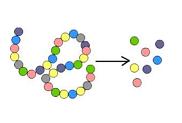Before entering fully into the meaning of the term catabolism, we are going to proceed to discover its etymological origin. In this case, we can state that it is a word of Greek origin. It is the result of the sum of the following components:
-“Cata”, which can be translated as “from top to bottom”.
-“Bole”, which is synonymous with “action of throwing”.
-The suffix “-ism”, which is used to indicate “activity”.
The concept refers to the set of procedures that the metabolism carries out to degrade substances and thus generate others that are simpler.
 Catabolism, therefore, involves the conversion of complex molecules into simpler ones . In the process, energy is released that the body is responsible for storing. Catabolism generally consists of redox reactions (reduction-oxidation).
Catabolism, therefore, involves the conversion of complex molecules into simpler ones . In the process, energy is released that the body is responsible for storing. Catabolism generally consists of redox reactions (reduction-oxidation).
It can be said that catabolism is the inverse of anabolism , which requires energy to synthesize complex biomolecules through simpler ones. The totality of the processes of catabolism and anabolism constitute what we know as metabolism.
Through digestion , biomolecules such as lipids and proteins are degraded and converted into monomers (monosaccharides, amino acids, etc.), a process that takes place outside the cells. Once these smaller molecules are obtained, they become even simpler inside the cell.
An example of a catabolism process is glycolysis , which involves the breakdown of glucose . In this process, glucose is oxidized, a reaction that releases the energy that was in its chemical bonds.
The sequence of reactions that is generated within the framework of catabolism or anabolism is called the metabolic pathway . This begins in an initial substrate, continues in intermediate metabolites and results in several final products. According to the metabolic route followed and the nature of the molecule, catabolism develops reactions with different efficiency and the performance, therefore, varies.
It is important to know that there is a lot of talk about muscle catabolism. This term includes the situation that occurs when the organism, not receiving food of any kind, proceeds to nourish itself. Specifically, it is sustained by its tissues, which means that a reduction of the muscle takes place, because it is consumed. And that ends up generating a loss of so-called muscle mass.
A situation of this type occurs, above all, on two occasions: when a person goes on a diet or when they do a strong workout and do not have adequate nutrition.
Precisely to avoid these situations, we must take into account that it is necessary and essential to provide the body with proteins, which will keep the muscles in the appropriate state. To do this, you must include products such as chicken and turkey meat, cereals, a wide variety of vegetables and also fish in your diet. In the latter case we are fundamentally referring to varieties such as tuna and salmon, among others.
